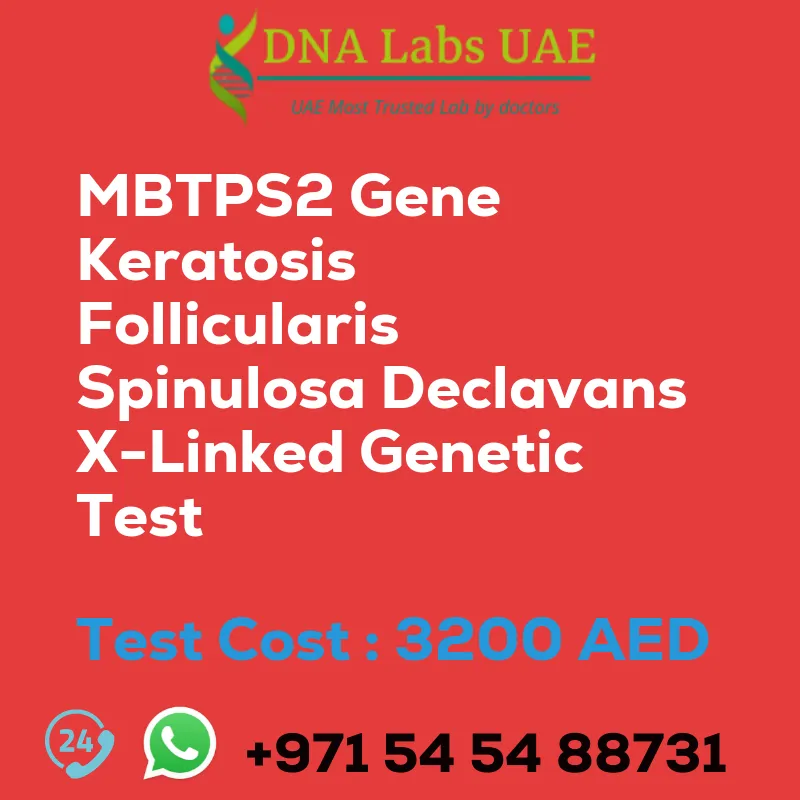MBTPS2 Gene Keratosis follicularis spinulosa declavans X-linked Genetic Test
Components: MBTPS2 Gene Keratosis follicularis spinulosa declavans X-linked Genetic Test
Price: 3200.0 AED
Sample Condition: Blood or Extracted DNA or One drop Blood on FTA Card
Report Delivery: 3 to 4 Weeks
Method: NGS Technology
Test type: Osteology Dermatology Immunology Disorders
Doctor: Dermatologist
Test Department: Genetics
Pre Test Information: Clinical History of Patient who is going for MBTPS2 Gene Keratosis follicularis spinulosa declavans, X-linked NGS Genetic DNA Test. A Genetic Counselling session to draw a pedigree chart of family members affected with MBTPS2 Gene Keratosis follicularis spinulosa declavans, X-linked NGS Genetic DNA Test gene MBTPS2
Test Details: MBTPS2 gene Keratosis follicularis spinulosa declavans, X-linked NGS Genetic Test is a genetic test that focuses on the MBTPS2 gene, which is associated with a condition called Keratosis follicularis spinulosa declavans (KFSD). KFSD is a rare genetic disorder that primarily affects the skin, causing the development of small, rough bumps on the skin, especially on the face, neck, and scalp. This test utilizes Next-Generation Sequencing (NGS) technology to analyze the DNA sequence of the MBTPS2 gene. NGS allows for the simultaneous analysis of multiple genes, providing a comprehensive evaluation of genetic variations within the MBTPS2 gene. By identifying specific mutations or variations within the MBTPS2 gene, this genetic test can confirm a diagnosis of KFSD. It can also help determine the genetic cause of the condition in individuals with suspected KFSD but without a confirmed diagnosis. The results of this genetic test can aid in genetic counseling, family planning decisions, and potentially guide treatment options for individuals with KFSD. It is important to note that this test specifically focuses on the X-linked form of KFSD, which means that it is primarily seen in males, although females can also be carriers of the gene mutation. It is recommended to consult with a healthcare professional or a genetic counselor to understand the implications and limitations of this genetic test before undergoing the test.
| Test Name | MBTPS2 Gene Keratosis follicularis spinulosa declavans X-linked Genetic Test |
|---|---|
| Components | |
| Price | 3200.0 AED |
| Sample Condition | Blood or Extracted DNA or One drop Blood on FTA Card |
| Report Delivery | 3 to 4 Weeks |
| Method | NGS Technology |
| Test type | Osteology Dermatology Immunology Disorders |
| Doctor | Dermatologist |
| Test Department: | Genetics |
| Pre Test Information | Clinical History of Patient who is going for MBTPS2 Gene Keratosis follicularis spinulosa declavans, X-linked NGS Genetic DNA Test. A Genetic Counselling session to draw a pedigree chart of family members affected with MBTPS2 Gene Keratosis follicularis spinulosa declavans, X-linked NGS Genetic DNA Test gene MBTPS2 |
| Test Details |
MBTPS2 gene Keratosis follicularis spinulosa declavans, X-linked NGS Genetic Test is a genetic test that focuses on the MBTPS2 gene, which is associated with a condition called Keratosis follicularis spinulosa declavans (KFSD). KFSD is a rare genetic disorder that primarily affects the skin, causing the development of small, rough bumps on the skin, especially on the face, neck, and scalp. This test utilizes Next-Generation Sequencing (NGS) technology to analyze the DNA sequence of the MBTPS2 gene. NGS allows for the simultaneous analysis of multiple genes, providing a comprehensive evaluation of genetic variations within the MBTPS2 gene. By identifying specific mutations or variations within the MBTPS2 gene, this genetic test can confirm a diagnosis of KFSD. It can also help determine the genetic cause of the condition in individuals with suspected KFSD but without a confirmed diagnosis. The results of this genetic test can aid in genetic counseling, family planning decisions, and potentially guide treatment options for individuals with KFSD. It is important to note that this test specifically focuses on the X-linked form of KFSD, which means that it is primarily seen in males, although females can also be carriers of the gene mutation. It is recommended to consult with a healthcare professional or a genetic counselor to understand the implications and limitations of this genetic test before undergoing the test. |








